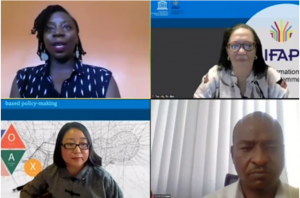By UNESCO |
The event, supported by the International Program for Development of Communication (IPDC) of UNESCO, gathered a number of leading national actors and experts who shared best practice and lessons learned from implementing national assessments of ROAM-X indicators in Benin, Ethiopia, Ghana, Kenya, Niger and Senegal.
Juliet Nanfuka representing CIPESA opened the session by recalling that the event builds on CIPESA’s joint efforts and long-term partnership with UNESCO to raise awareness on the intersection of access to information and application of the ROAM-X indicators initiated at World Press Freedom Day celebrations in 2018 and the same year’s Forum on Internet Freedom in Africa as part of the International Day for Universal Access to Information (IDUAI).
Xianhong Hu, UNESCO’s focal point of the ROAM-X project, presented the global progress of assessing ROAM-X indicators in 45 countries and highlighted Africa as the leading continent with 17 countries having undertaken the assessment. Ms Hu stressed the urgent need to scale up the ROAM-X indicators’ assessments in more African countries to promote meaningful connectivity and humanistic digital transformation for advancing human rights and sustainable development.
Giving perspectives from West Africa, Professor Alain Kiyindou, Lead researcher of the assessment in Benin and Niger, pointed out the gender inequalities in access to Internet and in the workplace and called for more inclusion of African actors and vulnerable groups in the digital space as well as in the composition of national Multi-stakeholder Advisory Boards and research teams.
Also giving a West African perspective, Dr. Gideon Anapey, researcher for the assessment in Ghana, stressed that, “For African Member States to engage with UNESCO and initiate the ROAM-X project in the region, there is a strong need for capacity building that consists in deepening awareness on ROAM-X, fostering various stakeholders’ engagement, covering ICT integration and inclusion”.
Aderaw Tassew, Mr Asrat Mulatu (Ph.D), both representing Ethiopia and Ms Grace Githaiga from the Kenya ICT Action Network (KICTANet) presented on how they approached the assessment in their respective countries alongside highlighting the potential opportunities held by the indicators. Despite vast dissimilarities between the two countries in Internet access, they noted shared challenges unveiled by the assessment including on data collection, funding, political instability, weak legal frameworks and political will, digital literacy gaps, and various levels of the abuse of digital rights.
UNESCO and CIPESA jointly call for more African countries to take up the national assessment of ROAM-X indicators to promote Internet reforms for advancing media freedom and digital rights in Africa. Following the webinar, in-country training sessions on the indicators will be conducted by CIPESA in Cameroon, Malawi, Namibia, Somalia and Uganda. Member States that are interested in getting involved are invited to reach out to CIPESA: [email protected].
In 2015, the 38th General Conference of UNESCO endorsed a new definition on the Universality of the Internet based upon four principles – Rights, Openness, Accessibility to all and Multi-stakeholder participation- the ROAM principles. The four pillars outline a comprehensive framework for the assessment of national digital landscapes towards focusing on multiple dimensions of human rights, open Internet, quality of access and inclusive multi-stakeholder governance, promoting the growth and evolution of the Internet, and the achievement of the Sustainable Development Goals.
This article was first published by UNESCO on March 22, 2022

